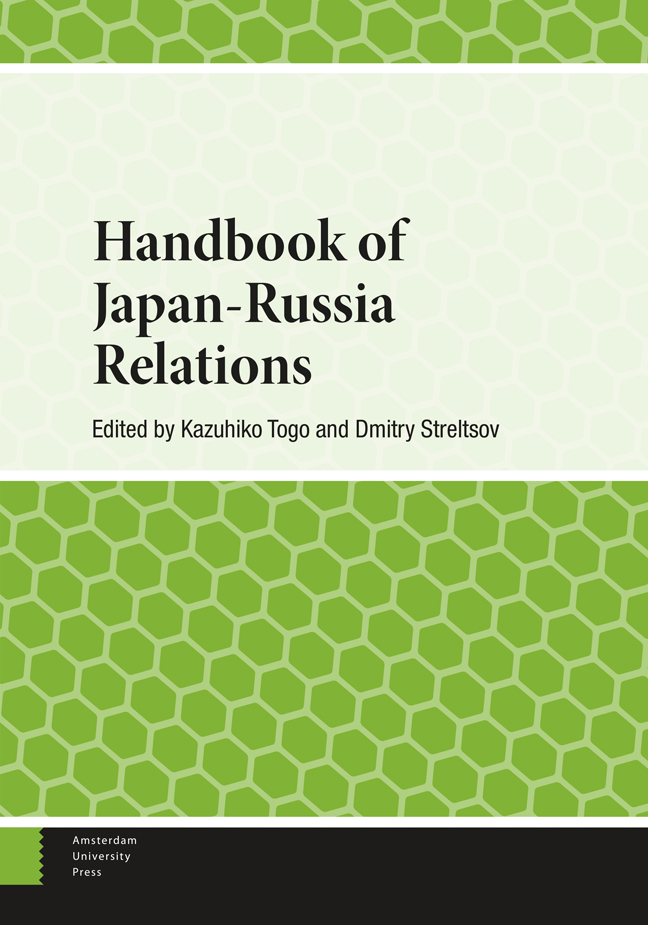Book contents
- Frontmatter
- Contents
- Dedication
- Acknowledgements
- Contributors
- Abbreviations
- Introduction
- Part 1 War and Peace: Diplomatic Relations and Security
- Part 2 Territory
- Part 3 The Economy and Energy
- Part 4 Disaster Cooperation
- Part 5 Culture
- Part 6 Perceptions of the Other
- Appendix 1 1956 Joint Declaration
- Appendix 2 Tokyo Declaration (1993)
- Appendix 3 Moscow Declaration (1998)
- Appendix 4 Irkutsk Statement (2001)
- Appendix 5 Foreign Ministry Statement (2022)
- Index
3 - Post-Cold War Security Issues in Russia-Japan Relations: The Russian Perspective
Published online by Cambridge University Press: 26 March 2024
- Frontmatter
- Contents
- Dedication
- Acknowledgements
- Contributors
- Abbreviations
- Introduction
- Part 1 War and Peace: Diplomatic Relations and Security
- Part 2 Territory
- Part 3 The Economy and Energy
- Part 4 Disaster Cooperation
- Part 5 Culture
- Part 6 Perceptions of the Other
- Appendix 1 1956 Joint Declaration
- Appendix 2 Tokyo Declaration (1993)
- Appendix 3 Moscow Declaration (1998)
- Appendix 4 Irkutsk Statement (2001)
- Appendix 5 Foreign Ministry Statement (2022)
- Index
Summary
The chapter seeks to answer the questions of what is Russia’s position on major security issues in its relations with Japan, how has it transformed after the end of the Cold War and what are the driving factors behind the transformation. It takes a combined approach in answering these questions by looking both into the evolution of Russia’s position and specific security issues such as the US-Japan alliance, the transformation of Japan’s national security policy, Japan’s Indo-Pacific strategy, security aspects of the territorial dispute, Russia’s military build-up in the Far East, and Russia-China cooperation and security on the Korean Peninsula. Russia-Japan interaction in the security domain is analyzed in a correlation with political relations and with a focus on the 2010–2020s and the sharp deterioration of relations in 2022.
Introduction
The end of the Cold War marked a drastic shift in security relations between Russia and Japan, turning them from potential mutual security threats on different sides of the Cold War divisions to more neutral observers and even partners in a number of areas. Although the unresolved territorial dispute over the Southern Kuril Islands that Japan calls its “Northern Territories” was inherited from the Cold War, it has largely figured in the bilateral relationship as a political issue. The key characteristic of post-Cold War Russia-Japan relations is that neither country has perceived the other as an imminent security threat, paving the ground for a friendlier interaction in the security domain, including high-level dialogues, security exchanges and confidence-building measures. Russia’s Foreign Policy Concepts refer to the importance of a dialogue with Japan in politics and security, in particular concerning regional security in the Asia-Pacific region. Both Russia and Japan have benefited from such exchanges as both countries are neighbors which share a maritime border, even though it has not been delimited due to the existence of the territorial dispute.
At the same time, the Russia-Japan security relationship has not been devoid of issues causing concern or criticism of one or another partner. For Russia, undoubtedly the USJapan alliance represents the greatest challenge that generates security issues in its relations with Japan. As Russia-US relations gradually deteriorated through the 2000s and increasingly so in the 2010s and beyond, so did the perception of American alliances in Asia.
- Type
- Chapter
- Information
- Handbook of Japan-Russia Relations , pp. 31 - 55Publisher: Amsterdam University PressPrint publication year: 2024

